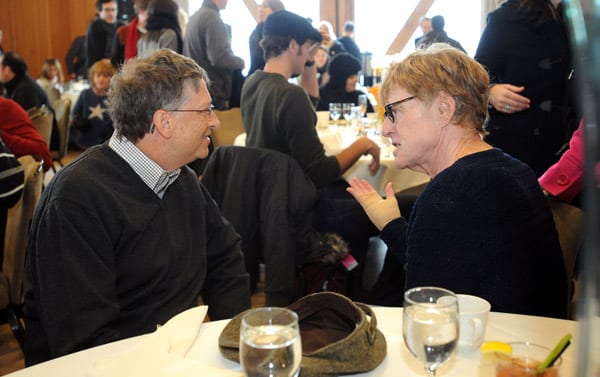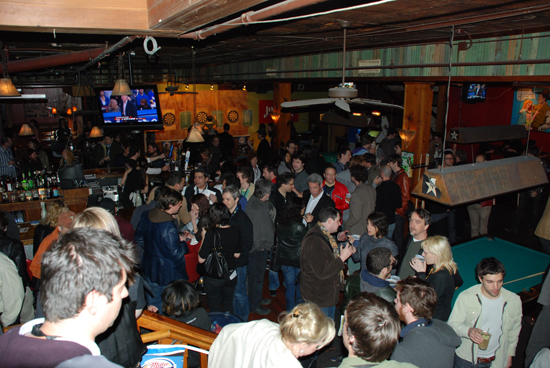Making the Most of Your Festival Experience Part Two: Attending the Fest
by Basil Tsiokos on February 25, 2011 in Festival Strategy

Robert Redford and Bill Gates at the Sundance Director's Brunch, 2010 Sundance Film Festival
Dear Filmmakers:
This is the second of three posts addressing what you can and should do to make the most of your film festival premiere for your film and for your career. My last post covered essential preparation necessary before you bring your film to its festival premiere – including developing a PR/promotion strategy, potentially hiring a publicist, setting up a website, putting together a presskit, utilizing social media, possibly engaging a sales rep, and deciding if you should make DVDs available to the press before or during the festival screenings. This and the next post moves beyond preparation to your time on the ground at the festival, and what you should be doing to maximize your experience.
First of all – if you have gone to the trouble of making your film and sent it around for festival consideration, there should be no question that you should attend your festival premiere. I realize travel and accommodation is expensive, so you should have considered this financial aspect as you formulated your festival strategy. As indicated in previous posts for IFP, you should have done your research and selected reputable festivals that are supportive of filmmakers and their work, and you should have a very clear sense of what the festival’s audience is like, and what you should and should not expect from your time there – ie, it’s a festival that is largely community-focused and there’s no industry to speak of vs it’s a festival set in the heart of a smaller European city that draws a handful of local distributors vs it’s a large discovery festival that is on the calendar of every single film industry professional in NY and LA. It’s important to know what you’re getting yourself into – if you show up to the Smallville Film Festival thinking you’re going to clinch a deal for your next feature, you’re going to be sorely disappointed, but if instead you recognize that you’re playing that particular festival because it’s going to allow you to interact with a grassroots audience that can help spread positive word of mouth about the film, and you’re ready to have a great Q&A and more informal discussions with that audience, you’ll have a much better time.
An important note here – if you’ve perhaps not done your homework sufficiently before submitting to a festival, but you start reading up on the event after you’re accepted, and you don’t like what you’re finding out – ie, past filmmaker participants have written about their terrible experiences, the organizers don’t seem to be particularly interested in film but instead might be bilking filmmakers for submission and participation fees – it’s ok to say “no.” Better you don’t premiere your film for a little while longer than bring it to an event that you’re reasonably sure is not going to be a positive place for either your film or for you.
All this said, let’s assume a reputable festival has chosen your film, and you’ve done your research and have at least some sense of what to expect. If you have questions – and you will – ask your festival representative. Most festivals, as understaffed and volunteer-run as many are, will follow up their acceptance notification with information about who to contact for various things – print trafficking, press/promotion, and hospitality. Make use of these services. Even if they’re extremely limited in what they can do for you, ask them questions. Ask for recommendations on where to stay (if they’re not already offering travel assistance), ask about what press is coming, ask about what industry is coming (if applicable), ask about any special events you should be prepared for – ie galas or filmmaker receptions.

The crowd at the SXSW Film Opening Party, 2008 SXSW
Keep track of all correspondence you receive from the festival. Note the basics – when you should arrive, where and when you can register to pick up your badge and tickets – so you can make sure that you’re clear on what to do from the moment you get to the festival. Pay attention to any advice the festival organizers provide you, especially if it’s coming from the Festival Director or Artistic Director. It’s in these individuals best interest that you have a good experience at their event, and the advice they impart is usually the result of years of experience at their festivals. Don’t take it lightly when John Cooper strongly urges you attend the filmmaker’s brunch at the Sundance resort, or if Janet Pierson recommends you show up at the SXSW awards ceremony.
Some fests are packed with events from day one, others not so much. As a filmmaker you ideally should have access to just about everything and it’s in your best interest to take part in as much as possible – this makes you a visible, and, hopefully approachable, presence at the event; allows you to meet other filmmakers, who might end up being collaborators on a future project, or might be able to introduce you to a future collaborator; and puts you in a position to get to know the festival staff, who might introduce you to significant contacts or do you favors, if your personalities gel. This is important – yes, you’re attending the event to work/network, but try to stay true to yourself. Don’t affect a new personality – especially if you’re at a larger event that draws seasoned industry professionals. Industry vets can spot a fake, and they’re not going to want to work with a fake. Don’t pretend to know things you don’t or people you don’t – chances are the people you’re trying to show off for might really know those things or people, and you don’t want to be caught in a lie when you’re trying to sell your film or make inroads to getting your next one made.
Regarding events, absolutely make sure you take part not only in the giant galas, but also and especially the smaller filmmaker-only events – the retreats, the cocktails, the dinners – whatever special/exclusive events the festival has put together to recognize and honor you. It’s often at these lower-key events that significant friendships or partnerships can be forged, outside of the relative chaos of the larger parties with all of their distractions. Some filmmakers might get a bit freaked out by everything that’s going on. Furthermore, they might have just worked non-stop for the past several weeks to finish their film in time for the premiere and are understandably exhausted. Some filmmakers may just be more introverted and not huge fans of parties. I acknowledge this – know your limits and, again, stay true to yourself. You personally don’t need to be at every single party, but you also can’t retreat completely in your condo/hotel room. Someone from your team – your producers, your actors, your subjects, your friends, even your family – should try to maintain some kind of presence throughout the festival at various events and receptions. This has always been the reality for independent filmmakers, and even moreso in the last five years – you are responsible for actively promoting your work. Your job doesn’t end when you lock picture. The impact of you, or some more outgoing member of your team, attending a party and talking to new people about your film, is hard to measure in a quantitative way, but it’s there. If your team isn’t advocating for your work – the people who know about it intimately – who will?
The next post will focus on your actual premiere, and how you should be prepared to handle both the actual screening, and what comes after.
